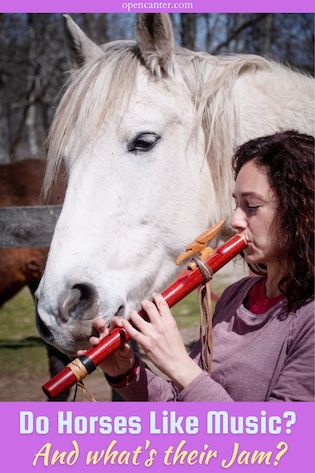Affiliate Disclaimer
As an Amazon Associate I earn from qualifying purchases. It helps me keep the website going. Thank you for your support.
Given how much humans like music, it is natural to wonder whether animals, including horses, are also affected by music in a similar way. Do horses like music? To answer this question, we must dive into the world of equine behavior and explore the various factors affecting their responses to music.
It is no secret that animals respond positively to music, and the concept of horses liking music is not a new one. Throughout history, humans have used music as a way of soothing horses, particularly during training and transport. Many professional riders and trainers use music to help their horses relax and focus. But do these responses of relaxation or focus really mean that horses enjoy music?

How Horses Hear
To understand whether horses like music, we first need to understand how they perceive sound.
Horses have excellent hearing, with a range of frequencies that is similar to humans. Humans hear from 20-20,000 Hertz (Hz) and horses hear one-third more than that up to 35,500 Hz.
They have ears that can swivel and move independently, allowing them to locate the slightest source of sound quickly. Therefore, music needs to be carefully selected to ensure that it does not cause any stress or discomfort to the horse.
One of the reasons they can be easily startled by loud or sudden noises is that they have a complex range of senses that are different from those of humans.
Horses are known for their ability to communicate through body language, and they can pick up on subtle changes in their environment. In the wild, horses use their hearing to detect predators and communicate with one another.
What Sounds Horses Find Pleasant
So, what types of sounds do horses actually find pleasant? One study conducted in 2017 aimed to answer this question by playing a variety of sounds to a group of horses and measuring their behavioral responses.
The researchers found that horses responded most positively to sounds that were similar to natural environmental sounds, such as running water and rustling leaves. They also found that horses responded negatively to sudden, loud, or jarring sounds, such as gunshots or car horns.
These findings suggest that while horses may not necessarily enjoy listening to music in the way that humans do, they may still find certain types of sounds pleasant or calming.
It’s possible that music that incorporates natural sounds, such as ocean waves or birdsong, may be more appealing to horses than music that consists solely of instruments or vocals.

Music and Horses’ Emotional Life
Along with understanding how horses hear, it’s also important to understand how music affects animal emotions. Research has shown that music can have a powerful impact on animals, and can be used to help reduce stress, anxiety, and aggression in a variety of species.
For example, studies have found that cows exposed to calming music produce more milk and are less stressed, while dogs in animal shelters are calmer and less anxious when exposed to classical music.
For horses, calming them down during veterinary procedures and competitions, reducing anxiety during transportation, and promoting relaxation after exercise are some of the purposes for which music has been used.
Many horse owners and trainers also play music in the barn or during riding sessions to help keep their horses calm, focused, and happy. There are over 20 ways you can tell if a horse is happy, like when it’s relaxing and its bottom jaw relaxes. Horses can become so content that their bottom lip will sometimes droop open.
In addition, music can also provide a distraction for horses, particularly if they are stabled for long periods of time. Playing music can help to alleviate boredom and prevent destructive behaviors such as weaving and cribbing.
Horse Music?
There are also other forms of music therapy that can be used to benefit horses. While there is limited research into the benefits of music therapy as a form of treatment for horses, it is believed that it can have a positive impact on both their physical and emotional well-being.
Even as recently as 2021, new ways to use music therapy on horses have been examined. At a leading horse healthcare company in the United States, Boehringer Ingelheim, strive to provide non-drug strategies to reduce stress and increase overall health.
According to in-house vet Sarah Reuss, VMD, lots of different factors cause horses to stress. For example, the simple act of moving a companion horse from a pasture or stall or even just bad weather can cause horses to stress out.
Stress can lead to physical illnesses like stomach ulcers which can be painful and dangerous and can lead to poor performance. In an effort to find alternative ways to reduce stress, they collaborated with Janet Marlowe, an animal sound behaviorist, to create music specifically designed for horses.
According to Marlowe, her horse-music-composition, called “Relax Trax” was a result of data she received from a 2015 study. She participated in treating 120 racehorses at the University of Loveland in Poland using her specifically equine-designed music for 6 months.
There were three groups of 3-year-old horses: one was a control group, one received three 30-minute massages per week and one group listened to the equine-designed music for five hours a day.
They measured heart rates and tested saliva for cortisol levels and found that the music listeners had more powerful rest and recovery systems, with the most pronounced effects after 2-3 months of listening to the music. And, they won more races!
Performance Enhancing Music
In addition to music therapy, another way in which music can be used to benefit horses is to enhance their performance, particularly in the field of dressage. Many professional riders use music to create a rhythm for their horse to follow, helping them focus and perform at their best.
Very high-level equine performers and their riders become like a single entity when they pair music with their amazing and intensely athletic freestyle performances. If you watch even one, like “Mopsi”, ridden by five-time Olympian Steffan Peters (USA) you will not only see the deep concentration between the pair, but you will also get goosebumps seeing the joy they are experiencing together when they hit the beat to the split second and their movement perfectly matches the music.
Does the Type of Music Matter?
And now for the most interesting and widely studied aspect of the examination of this question: Do horses like music and if so, what type?
Music is a complex form of sound, with different frequencies, rhythms, and melodies that can evoke different emotions and responses in humans. However, whether horses perceive music, in the same way, is unclear.
Two themes, however, do emerge.
- First, some studies suggested that horses can distinguish between different types of music.
- Second, while others found no significant difference in their responses to various styles, they did find a measurable reduction of stress.
Classical, Country, or Heavy Metal?
In one of the earliest studies on horses and music, conducted in the 1950s by Dr. W.H. Thorpe, a British zoologist, he played music for horses in a stable and observed their behavior(1).
He noticed that the horses became restless when he played music with a fast tempo and high pitch but calmed down when he played music with a slow tempo and low pitch. Thorpe concluded that horses prefer music with a slower tempo and lower pitch.
Another study, conducted by McGreevy and McLean in 2007, found that horses appeared to prefer classical music over silence or pop music(2).
The researchers played music to horses while they were being groomed and observed their behavior. They found that the horses spent more time in a relaxed state (measured by a lowered head and a drooping lip) when classical music was played, compared to pop music or silence.
More recent studies have produced mixed results. In a study published in the Journal of Veterinary Behavior in 2015, researchers played classical music, country music, and heavy metal for horses in a stable and monitored their heart rates and behavior(3).
They found that the horses’ heart rates increased slightly when they heard heavy metal music, but there was no significant difference in their behavior or heart rate between classical and country music.
Anecdotal evidence in a discussion thread on the equestrian website Horse & Hound found several riders who shared their experiences with music and horses.
One rider reported that her horse would ‘fall asleep’ when she played classical music in the barn, while another said her horse ‘loves a bit of Ed Sheeran.’ Several riders reported that their horses seemed to prefer music with a slow tempo and calming melodies, such as classical or instrumental music.

Do Horses Like Music or Just Feel Relief?
Adding music in stressful situations helps researchers understand horses’ responses and gives them ideas to help lower heart rates at tense moments.
In a study conducted by Lesimple et al. in 2013, they investigated the effects of music on horses’ heart rate variability (HRV)(4). HRV is a measure of the variation in time between heartbeats and is used as an indicator of physical stress.
The researchers found that playing music to horses had a significant effect on their HRV, with slower music leading to a greater increase in HRV, although it’s still unclear whether they enjoyed listening to the music or simply found it relaxing.
Another study published in the Journal of Equine Veterinary Science in 2017, examined the effect of music on horses’ stress levels during transportation(5). The researchers played either classical or rock music for horses while they were being transported and measured their heart rate, respiratory rate, and cortisol levels.
They found that both types of music reduced the horses’ stress levels, so it was relaxing, but there was no significant difference between the two categories.
And lastly, research on the stress levels of horses undergoing veterinary procedures, conducted by the University of Central Lancashire in the UK, found that horses showed a positive response to music with a tempo of between 60 and 80 beats per minute(6). This tempo is similar to their resting heart rate and suggests that horses are more likely under stress to respond positively to music that is slow and calming.
Other Factors Affecting Horses’ Preferences
Though these studies suggest that horses can perceive music and it can have an effect on their behavior and stress levels, there are a few other factors that play a part, including their individual preferences and experiences.
Breeds
Horses have different personalities and temperaments which also vary from breed to breed. Some horses may be more sensitive to sound than others, while others may be more relaxed in noisy environments.
For example, it is a commonly held opinion that Arabians, a typically hot-blooded horse used frequently for endurance riding are more high-strung than Percherons, a draft breed mostly used for pulling. Most people would expect an Arab to be highly affected by loud noises, while a Percheron may not be so bothered.
Though hotter horse breeds, like Thoroughbreds or Saddlebreds may be more easily spooked by sudden sounds and may find music unsettling, environmental conditioning plays a role as well.
Conditioning
It is important to note that horses are animals that live in the present. That is to say that they respond more dramatically to sudden movements, sights, and sounds that are unfamiliar in their environments. They have survived in the wild by knowing what is “normal” to be happening around them on a daily basis.
Horses that have been exposed to music from a young age may be more familiar and comfortable with music than horses that have never been exposed to it. Similarly, horses that have had positive experiences with music, such as being trained to move to music, may be more likely to respond favorably to it.
If you are going to introduce music in the barn or during training, remember it is going to be unusual at the beginning, so starting small and building on positive responses will be the most successful strategy.
Personalities
A final factor that can influence a horse’s response to music is its individual personality. Like humans, horses have their own unique personalities on any given day, and what one horse finds calming, another may find annoying.
Some horses may be more sensitive to certain types of music or may prefer silence altogether. It is important for people to observe their horse’s behavior when playing music, to ensure that it is not causing any mental or physical discomfort.
Final Thoughts
As promised, in exploring the question, do horses like music? we have looked at how they hear, what they find pleasant, how they express ‘like’ or whether ‘like’ just means ‘relax’.
We’ve looked at music for therapy, stress reduction, and improving performance and found that it really can work for all those situations… depending on the individual horse.
Maybe a better question to answer is, what does YOUR horse like? Try out some classical, country or even some Ed Sheeran and see what you get! Horses are magnifiers of the energy around them, so if you’re happy listening to music, you can bet they’ll pick up on that!
References:
1) Thorpe, W.H. “Music in stables: A study in equine reactions.” Nature, vol. 172, no. 4387, 1953, pp. 606-607.
2) McGreevy, P.D. & McLean, A.N. (2007). “Behavioral and physiological effects of an auditory stimulation program on horses undergoing training.” Journal of Veterinary Behavior, 2(2), 45-52. doi: 10.1016/j.jveb.2006.10.005.
3) Kirste, J., et al. “Music in the exercise arena: impact on horse and human behavior.” Journal of Veterinary Behavior, vol. 10, no. 5, 2015, pp. 404-408.
4) Lesimple, C., et al. “Heart rate variability of horses in response to different riding exercises.” Journal of Veterinary Behavior, vol. 8, no. 2, 2013, pp. 91-98.
5) Greiveldinger, L., et al. “The effect of music on horses’ stress during transportation: A pilot study.” Journal of Equine Veterinary Science, vol. 55, 2017, pp. 10-14.)
6) Beryl L. C. Semple, et al. “The effect of different types of music on the stress levels of horses undergoing veterinary procedures.” Physiology & Behavior, vol. 106, no. 5, 2012, pp. 698-705.




